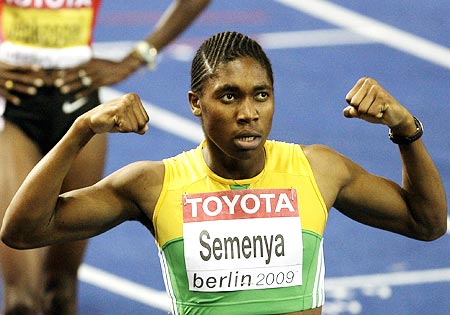 The rapid improvement of South African teenager Caster Semenya, who won the women's world 800 metres title, prompted track and field officials to order a gender verification test.
The rapid improvement of South African teenager Caster Semenya, who won the women's world 800 metres title, prompted track and field officials to order a gender verification test.
Here are some details about sex testing, which was introduced more than 40 years ago.
* CONDUCTING TESTS:
-- Laboratory and genetic testing were introduced at the 1968 Mexico City Olympics.
-- Women typically have two X chromosomes and men have an X and a Y chromosome in each of their cells. The presence of two X chromosomes is taken as confirmation of the athlete's female gender. Test results for about one in 500-600 athletes are abnormal.
* TESTING:
-- The International Association of Athletics Federations abandoned gender verification tests in the early 1990's concluding they were not needed. This was thought to be especially true because of the current use of urine testing to exclude doping: voiding is observed by an official in order to verify that a sample from a given athlete has actually come from his or her urethra.
-- The International Olympic Committee (IOC) suspended the tests before the 2000 Sydney Olympics. However, the Olympic Council of Asia still conducts tests.
* TRACK RECORD:
-
Polish sprinter Stanislawa Walasiewicz, who won the women's 100 metres at the 1932 Los Angeles Olympics, is the most notorious case. Walasiewicz changed her name to Stella Walsh and moved to the United States where she was shot dead in a robbery attempt in 1980.An autopsy showed she possessed male genitalia.
-
The first athlete to fail a sex test was Polish sprinter Eva Klobukowska in 1967, who won a 4x100 relay gold at the 1964 Tokyo Olympics. She was found to have a rare condition which gave her no advantage over other athletes.
-
Sisters Tamara and Irina Press won five track and field Olympic gold medals for the Soviet Union and set 26 world records in the 1960s. When gender testing was introduced the pair did not compete again.
-
Eight athletes failed the tests at the 1996 Atlanta Olympics but were all cleared by subsequent physical examinations.
-
Britain's Princess Anne, a member of the equestrian team, was excused from the gender test at the 1976 Montreal Olympics.
-
Indian Santhi Soundarajan was stripped of the Asian Games women's 800 metres silver medal after failing a gender test in Doha in 2006. She was admitted to hospital in September 2008 following a suicide bid. She announced in June that she has turned to coaching.
* ARGUMENTS AGAINST GENDER TESTING:
-- The genetic tests provide potentially inaccurate results and discriminate against women with disorders of sexual development.
--- Genetic anomalies can allow a person to have a male genetic make-up but be physiologically female. Spanish hurdler Maria Patino, who failed a gender test in 1985, was reinstated after it was found that she was resistant to the strength- promoting qualities of testosterone.
Sources: British Medical Journal (www.bmj.com); The American Journal of Bioethics (www.bioethics.net); International SportMed Journal (www.fims.org)








